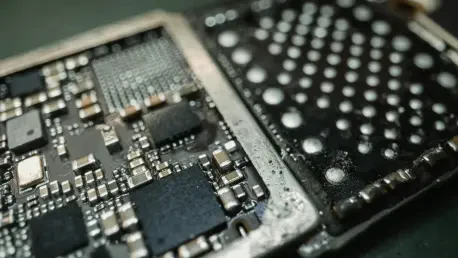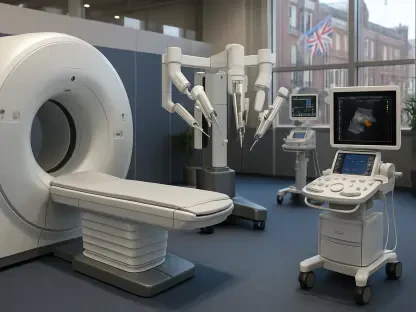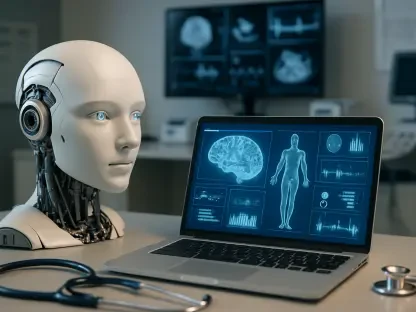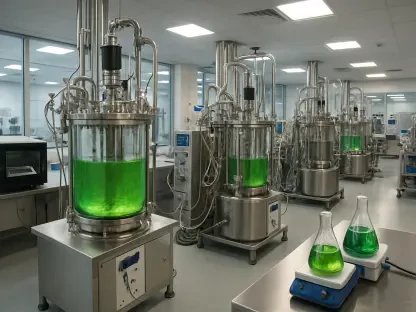Imagine a world where vehicles navigate bustling city streets without human intervention, medical devices track health metrics in real time with pinpoint accuracy, and everyday objects communicate effortlessly to simplify life. This vision, once confined to the realm of science fiction, is rapidly becoming reality thanks to the remarkable power of semiconductors. These tiny silicon-based chips, often no larger than a grain of sand, serve as the backbone of modern innovation, driving progress across a staggering array of industries. Far beyond their traditional role in computers and smartphones, semiconductors now underpin transformative technologies in automotive systems, healthcare solutions, the Internet of Things (IoT), and even the enigmatic field of quantum computing. Their evolution from basic hardware components to strategic enablers of cutting-edge advancements has reshaped markets, redefined societal norms, and opened doors to possibilities previously unimaginable. This exploration delves into how these miniature marvels are revolutionizing multiple sectors, examines the hurdles they face in widespread adoption, and looks ahead to the exciting future they promise as technology continues to advance at an unprecedented pace.
The Cutting-Edge Evolution of Semiconductor Technology
Semiconductor technology has undergone a profound transformation, moving well beyond the confines of traditional silicon to embrace innovative materials and designs that meet the demands of modern applications. Materials like silicon carbide (SiC) and gallium nitride (GaN) are now at the forefront, particularly in high-power scenarios such as electric vehicle (EV) systems, where they offer superior efficiency and thermal management compared to older silicon chips. This shift allows for enhanced performance in environments where energy conservation and durability are paramount. Moreover, the drive for miniaturization has led to chips that pack immense processing power into ever-smaller footprints, enabling their integration into compact devices across various fields. As industries push for greater sustainability, these advancements ensure that semiconductors can handle complex tasks without heavy energy costs, marking a significant leap from their rudimentary origins in early computing hardware.
Alongside material innovations, the specialization of semiconductor designs has become a critical factor in addressing sector-specific needs with precision. Low-power microcontrollers now dominate the IoT space, facilitating edge computing that processes data locally to reduce latency. Meanwhile, AI accelerators are being tailored for real-time decision-making in autonomous systems, demonstrating how chip architecture evolves to match unique challenges. In healthcare, ultra-compact sensors rely on mixed-signal integrated circuits to deliver accurate diagnostics in wearable devices. This relentless push for smaller, faster, and more energy-efficient solutions underscores a unifying trend across all industries: semiconductors are no longer one-size-fits-all but are instead bespoke tools engineered for maximum impact. Such adaptability highlights their role as catalysts for technological progress in an increasingly interconnected world.
Driving Change in the Automotive Sector
In the automotive industry, semiconductors have emerged as the silent force propelling the transition to electric and autonomous vehicles, fundamentally altering the landscape of mobility. These chips are integral to systems ranging from battery management in EVs to the intricate workings of Advanced Driver Assistance Systems (ADAS) that enhance road safety. High-performance processors and sensor networks, incorporating technologies like Lidar, radar, and cameras, depend on semiconductors to interpret vast streams of data in milliseconds, enabling vehicles to react to their surroundings with precision. This capability is paving the way for a future where fully self-driving cars could become commonplace, reducing human error and transforming how people commute. The shift from mechanical dominance to electronic and software-driven value in vehicles further illustrates the pivotal role these tiny components play in redefining an entire industry.
Yet, the journey toward this automotive revolution is not without significant obstacles that test the resilience of semiconductor integration. Supply chain volatility, often exacerbated by global disruptions, poses a persistent threat to production schedules, delaying the rollout of next-generation vehicles. Cybersecurity risks also loom large as cars become increasingly connected, with potential vulnerabilities in over-the-air updates exposing them to malicious attacks. Additionally, managing the heat generated by high-performance chips within the confined spaces of a vehicle remains an engineering challenge that demands innovative cooling solutions. Addressing these hurdles is essential to maintaining consumer trust and ensuring that the promise of safer, smarter transportation does not falter amidst technical and logistical complexities.
Powering the Internet of Things (IoT) Ecosystem
The explosive growth of the Internet of Things (IoT) owes much to semiconductors, which enable the seamless connectivity and intelligence behind smart homes, industrial automation, and connected urban infrastructures. These chips, often designed for ultra-low power consumption, support edge computing by processing data directly on devices rather than relying on distant cloud servers. This approach slashes latency and boosts responsiveness, making real-time applications like predictive maintenance in factories or automated lighting in homes not just feasible but efficient. From tiny sensors monitoring environmental conditions to communication modules facilitating Wi-Fi and Bluetooth links, semiconductors are the glue binding billions of devices into a cohesive network that reshapes daily interactions with technology.
Despite their transformative potential, the widespread adoption of IoT semiconductors brings with it pressing challenges that cannot be overlooked. Data privacy and security stand out as major concerns, given the vast attack surface created by countless interconnected devices collecting sensitive information. A single breach could compromise entire systems, undermining trust in smart technologies. Furthermore, designing chips to meet stringent size and power constraints while maintaining reliability pushes the boundaries of current engineering capabilities. As IoT continues to expand, ensuring robust encryption and standardized protocols will be crucial to safeguarding data integrity. These issues highlight the delicate balance between innovation and responsibility in deploying connected solutions at scale across diverse environments.
Redefining Healthcare with Precision Technology
Semiconductors are revolutionizing healthcare by powering devices that bring unprecedented precision to diagnostics and patient monitoring, ultimately improving outcomes on a global scale. Wearable gadgets and implantable tools, equipped with miniaturized biosensors, continuously track vital signs such as heart rate or glucose levels, transmitting data for immediate analysis. Point-of-care diagnostic equipment, driven by advanced integrated circuits, enables rapid testing for genetic markers or proteins, accelerating the shift toward personalized medicine. This technological leap allows doctors to tailor treatments to individual needs, moving away from one-size-fits-all approaches and fostering a new era of proactive health management that could save countless lives through early intervention.
However, integrating semiconductors into healthcare is not without its complexities, as regulatory and ethical considerations present formidable barriers to widespread adoption. Ensuring the accuracy of AI-driven diagnostic algorithms, often embedded in these chips, remains a critical concern, as errors could have life-altering consequences. Data privacy also emerges as a significant issue, with sensitive health information vulnerable to breaches if not adequately protected. Moreover, navigating the stringent regulatory landscapes across different regions adds layers of complexity to deploying these innovations at scale. Overcoming these challenges requires not only technical advancements but also collaborative efforts between tech developers, medical professionals, and policymakers to establish frameworks that prioritize patient safety and trust above all else.
Exploring the Frontier of Quantum Computing
Quantum computing stands as the most ambitious frontier for semiconductor applications, promising to redefine computational capabilities in ways that classical systems cannot match. Unlike traditional binary processing, quantum chips manipulate qubits—units of quantum information—that leverage phenomena like superposition to perform complex calculations at extraordinary speeds. Semiconductors play a vital role in fabricating and controlling these qubits, often using techniques adapted from classical chip manufacturing. Though still in early stages, the potential applications are staggering, ranging from accelerating drug discovery by simulating molecular interactions to solving optimization problems that underpin logistics and finance, heralding a paradigm shift in how technology addresses humanity’s toughest challenges.
Significant technical hurdles temper the excitement surrounding quantum computing, underscoring the long road ahead before practical deployment becomes reality. Qubits are notoriously fragile, requiring extreme conditions such as cryogenic cooling to maintain stability, which poses logistical and cost barriers. Error correction also remains a daunting issue, as quantum systems are prone to interference that disrupts calculations. In the interim, hybrid models combining classical and quantum processing offer a pragmatic bridge, allowing incremental progress while researchers tackle these fundamental limitations. Continued investment in talent and infrastructure will be essential to unlocking the full transformative power of this field, ensuring that semiconductors remain at the heart of this groundbreaking evolution.
Shaping Tomorrow’s Intelligent World
Reflecting on the remarkable journey of semiconductors, it’s evident that these unassuming chips have carved a path from niche components to indispensable drivers of innovation across automotive, healthcare, IoT, and quantum computing domains. Their integration has fueled advancements that redefined mobility with autonomous vehicles, enhanced well-being through precision medical tools, connected lives via smart ecosystems, and pushed the boundaries of computation with quantum exploration. Challenges like supply chain fragility, security vulnerabilities, and ethical dilemmas have tested the pace of progress, yet the relentless pursuit of solutions has showcased the industry’s resilience. Looking ahead, the focus must shift to fostering strategic collaborations between tech giants and sector-specific innovators to accelerate chip specialization. Prioritizing robust cybersecurity measures and sustainable manufacturing practices will be vital to support this expanding landscape. As emerging architectures and hybrid systems take shape, monitoring breakthroughs in AI integration and quantum stability offers a glimpse into a future where intelligence permeates every facet of existence, promising smarter, safer, and more connected societies for generations to come.









